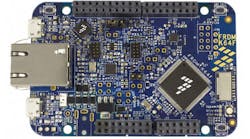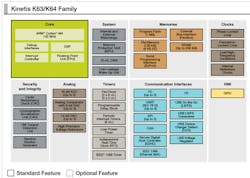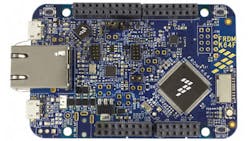Cortex-M4 Family Gets A Refresh
Freescale’s Kinetis K family of Arm Cortex-M4-based microcontrollers received an across the board refresh starting with the low end K11 and K12 through the high end K63 and K64 (Fig. 1). These include floating point support at the high end. The K11 and K12 have DSP support but not floating point. Pricing for these low cost models starts at $0.79. The family has versions that have 1 Mbyte of flash, 256 Kbytes of SRAM, and crystal-less USB support. Top end performers run at 180 MHz.
The FRDM-K64F Freedom board (Fig. 2) runs the 120 MHz Freescale K64F microcontroller. Its Arduino form factor allows access to a wide range of expansion boards/shields. The board has USB host, device and Ethernet support including built-in PHY and magnetics. There is also a Freescale FXOS8700CQ Inertial Sensor that includes a 3D accelerometer and 3D magnetometer.
Related Articles
- How Small A Chip Will A 32-bit Micro Fit In?
- New Kinetis MCUs Fortify EMC/ESD Protection
- Suppliers Deliver Low-Cost 32-Bit Arm Architecture
- Kinetis L MCUs Include LCD, USB Interfaces
- Towering Auto Sensors For Evaluation
The Kinetis K parts will also be available in Freescale’s Tower form factor (see “Prototyping A Tower” on electronicdesign.com) as well. The Tower system allows the processor board to be part of a stack with custom or off-the-shelf peripheral boards.
The announcement of the new chips was accompanied by the release of a variety of software starting with the Kinetis Software Development Kit (SDK). The SDK provides hardware abstraction layers, RTOS adapters, peripheral device drivers, and runtime libraries. It also includes a range of middleware and support utilities. Boot loader software allows in-system flash programming using the entire range of serial interfaces including CAN.
There is also a new Eclipse-based Freescale Kinetis Design Studio IDE for the Kinetis. It provides an entry-level development platform that works with the SDK. The SDK also supports the plethora of professional third party development tools from companies like Atollic, Green Hills Software, IAR Systems and ARM.
The platforms are also supported by mbed (see “Development Tools Move To The Cloud” on electronicdesign.com). This is a cloud-based development tool that targets Arm Cortex-M platforms including those from Freescale. The Freescale Freedom boards are supported by mbed. Developers can use the web-based IDE to compile applications that are downloaded and debugged on a target.
The new chips are also supported by the Freescale Processor Expert Software. This works with any development platform and allows developers to configure a system including generation of support software and drivers.



